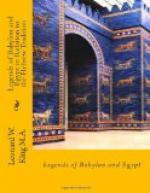L. W. King.
LEGENDS OF BABYLON AND EGYPT
IN RELATION TO HEBREW TRADITION
LECTURE I—EGYPT, BABYLON, AND PALESTINE, AND SOME TRADITIONAL ORIGINS OF CIVILIZATION
At the present moment most of us have little time or thought to spare for subjects not connected directly or indirectly with the war. We have put aside our own interests and studies; and after the war we shall all have a certain amount of leeway to make up in acquainting ourselves with what has been going on in countries not yet involved in the great struggle. Meanwhile the most we can do is to glance for a moment at any discovery of exceptional interest that may come to light.
The main object of these lectures will be to examine certain Hebrew traditions in the light of new evidence which has been published in America since the outbreak of the war. The evidence is furnished by some literary texts, inscribed on tablets from Nippur, one of the oldest and most sacred cities of Babylonia. They are written in Sumerian, the language spoken by the non-Semitic people whom the Semitic Babylonians conquered and displaced; and they include a very primitive version of the Deluge story and Creation myth, and some texts which throw new light on the age of Babylonian civilization and on the area within which it had its rise. In them we have recovered some of the material from which Berossus derived his dynasty of Antediluvian kings, and we are thus enabled to test the accuracy of the Greek tradition by that of the Sumerians themselves. So far then as Babylonia is concerned, these documents will necessitate a re-examination of more than one problem.
The myths and legends of ancient Egypt are also to some extent involved. The trend of much recent anthropological research has been in the direction of seeking a single place of origin for similar beliefs and practices, at least among races which were bound to one another by political or commercial ties. And we shall have occasion to test, by means of our new data, a recent theory of Egyptian influence. The Nile Valley was, of course, one the great centres from which civilization radiated throughout the ancient East; and, even when direct contact is unproved, Egyptian literature may furnish instructive parallels and contrasts in any study of Western Asiatic mythology. Moreover, by a strange coincidence, there has also been published in Egypt since the beginning of the war a record referring to the reigns of predynastic rulers in the Nile Valley. This, like some of the Nippur texts, takes us back to that dim period before the dawn of actual history, and, though the information it affords is not detailed like theirs, it provides fresh confirmation of the general accuracy of Manetho’s sources, and suggests some interesting points for comparison.




